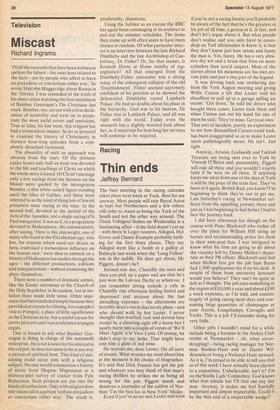Television
Miscast
Richard Ingrams
'Of all the accounts that have been written or spoken the falsest — the ones least related to the facts — are by people who affect to have no prejudices or convictions either way.' So wrote Malcolm Muggeridge about Russia in the 'thirties. I was reminded of the truth of his observation watching the first instalment of Bamber Gascoigne's The Christians last week. Bamber, too, set out with a firm declaration of neutrality and went on to perpetrate the most awful errors and omissions. True or false, his line went, this religion has had a tremendous impact. So let us proceed to examine the history of Christianity in thirteen hour-long episodes from a completely detached viewpoint.
The absurdity of such an approach was obvious from the start. Of the thirteen entire hours only half an hour was devoted to the life and teachings of Christ on which the whole story is based. Of Christ's message only a few sayings from the Sermon on the Mount were quoted by the incongruous Bamber, a slim white-suited figure standing amid the lilies of Galilee, and these were referred to as the kind of thing lots of Jewish preachers were saying at the time. In the second half, devoted to the period of the Acts of the Apostles, not a single saying of St Paul wasquoted. It was as if, in a programme devoted to Shakespeare, the commentator, after saying, 'Here is this playwright, one of many who lived in the Elizabethan age, who has, for reasons which need not detain us here, exercised a tremendous influence on the human race,' were then to embark on a history ofShakespearian studies through the ages — the different productions, editions and interpretations—without examining the plays themselves. '
There were a number of dramatic scenes, like the Easter ceremony at the Church of the Holy Sepulchre in Jerusalem, but in isolation these made little sense. Other sequences had been included simply because they providedan excuse for filming, for example a visit to Pompeii, a place of little significance in the Christian story, but a useful excuse for pretty pictures and even a reference to pagan orgies.
One is bound to ask what Bamber Gascoigne is doing in charge of this mammoth enterprise. He.is not known for his interest in the subject, he does not seem to be in any way a person of spiritual bent. This kind of miscasting could occur only with a religious subject. No one would commission a history of music from Magnus Magnusson or a thirteen-part survey of cricket from Fyfe Robertson. Such projects are put into the hands of enthusiasts. Only with religion does television call in a person 'with no prejudices or convictions either way'. The result is, predictably, disastrous.
Using the Jubilee as an excuse the BBC has again been rummaging in its archives to pad out the summer schedules. The items they come up with often seem to have been chosen at random. Of what particular interest is an interview between the late Richard Dimbleby and the late Archbishop of Canterbury, Dr Fisher? Or, for that matter, is Kenneth Home at Home worthy of regurgitation? All that emerged from the Dimbleby-Fisher encounter was a strong sense of the subsequent collapse of the old 'Establishment'. Fisher seemed supremely confident of his position as he showed the deferential Dimbleby round Lambeth Palace. He had no doubts about his place in the hierarchy. God was in his heaven, Dr Fisher was at Lambeth Palace,. and all was right with the world. Today even the monarch has a slightly worried look about her, as if uncertain for how long her services will continue to be required.


































 Previous page
Previous page